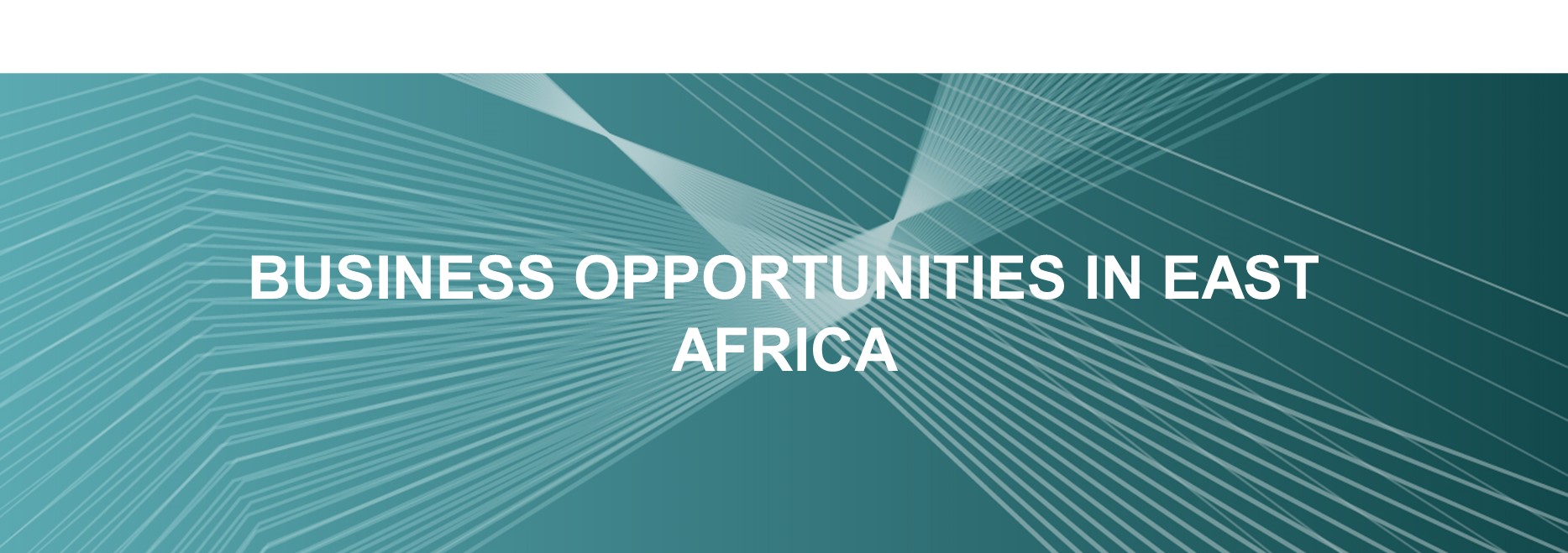- Business Opportunities in East Africa

Business Opportunities in East Africa
East Africa Community
The East African Community (EAC) is an intergovernmental economic union which aim to facilitate trade within its partner countries among other initiatives. The member countries of EAC are namely Burundi, Kenya, Rwanda, South Sudan, Tanzania, and Uganda which represents a market of more than 130 million people. The EAC has in place a fully-fledged customs union, one of the most accomplished in Africa.
N.B: Democratic Republic of Congo is a new member of EAC since 29th of March 2022

East Africa is a region overflowing with potential – from agriculture to mining to tourism to energy – investment opportunities abound; therefore, the governments of these countries are trying to align their strategies and views, through the EAC, to capitalize on the various benefits that can arise from such partnership.
EAC is a work in progress but in constant evolution. In 2010, it has launched its own common market for goods, labor, and capital with future goals of creating a common currency and ultimately a full political federation.
Advantages and disadvantages of a single market
|
Benefits
|
Downsides
|
Inward Flow of FDI in EAC
Inward flow of foreign direct investments into EAC will ultimately lift EAC’s economic growth rate trend. Inward FDI has the benefit to stimulate a region’s economic development as it creates a more conductive overall environment, which is understood by member states’ governments. In 2016, the partner states attracted an FDI inflow of USD 2,503 million whereas in 2019 they managed to attract USD 4149 million (EAC Investment Guide, 2019), which represents a 60% growth over three years. This growth highlights EAC’s success in its ability to attract foreign investors, through joint initiatives amongst the member countries. All pointers tend to indicate that EAC measures can deliver both in short term and long-term investments.
EAC Partner States continue to promote investment opportunities to attract FDI into a broader range of priority sectors (sectors highlighted below), EAC having previously prioritize FDIs inflows concentrated in manufacturing, construction, and services sectors.
Why invest in EAC?
EAC strategic location – offering direct water access to Asian markets as well as a favorable time zone allowing businesses to serve both markets to the East and West in a single day – is a big plus for foreign investors. Plus, the macroeconomic stability of the region can influence decisions of foreign investors to set up businesses. The market size of EAC suggest that there are vast opportunities to be seized and with the human capital, infrastructure and stability reducing the level of risks, foreign investors cannot overlook EAC as a place to do business with.
EAC investment sectors
There are multiple sectors currently buzzing in East Africa, and the EAC are doing their maximum best to give investors the ultimate treatment. EAC has targeted agriculture and Agribusiness as one of the business sectors to develop, to reach the region’s food independency. The EAC is also heavily relying on the manufacturing and tourism sectors as these sectors are very labor intensive.
Eastern Africa are also biding on the potential exploitation of the oil and gas discoveries in Uganda, Kenya, Tanzania as the energy sector offers other growth opportunities.
In addition, EAC is pushing, through education, its information and communications technology (ICT) development to support industrialization and structural transformation within the region.
How DTOS can help?
We can assist you to:
- Chose the adequate jurisdiction and corporate vehicle
- Structure your investment to set up your business
- Open individual or corporate bank accounts
- Manage accounting and financial accounting
- Assist in secondment of staff and payroll outsourcing
DTOS is a proudly independent Management Company founded in 1993. We capitalise on our strategic location in Mauritius and take pride in our heritage. Whether you are a corporation or an individual, our specialists provide tailor-made solutions to ensure you are always prepared for the journey ahead.
We always put clients’ first, safeguard their assets and help them navigate each regulatory landscape while striving to exceed expectations. Nurtured in the highest ethical standards, our people thrive to protect and manage your business with exemplary professionalism.
Contribution: Victor Lagesse
13 April 2022

